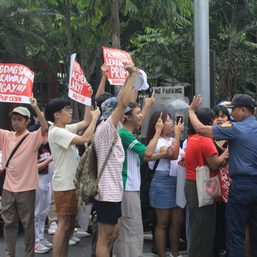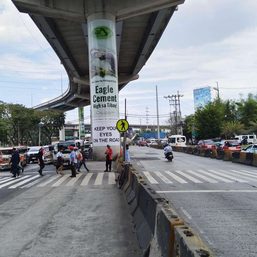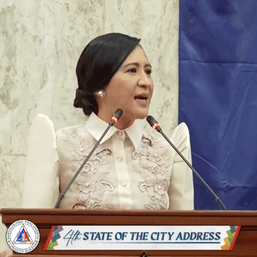SUMMARY
This is AI generated summarization, which may have errors. For context, always refer to the full article.
Quezon City, the largest city in Philippine coronavirus epicenter Metro Manila, reached a grim milestone on Tuesday, August 25, with its coronavirus cases breaching the 20,000 mark.
As of Tuesday, the city has 20,007 cases, according to the COVID-19 online database of the Department of Health (DOH).
This means QC cases comprise 18% or nearly a fifth of the 111,155 cases in Metro Manila, the region in the country hardest hit by the pandemic.
Manila has the second highest number of cases with 14,051, followed by Caloocan City (7,121), Makati City (6,618), and Taguig City (6,450).
Total cases per city:
- Quezon City – 20,007
- Manila – 14,051
- Caloocan – 7,121
- Makati – 6,618
- Taguig – 6,450
- Parañaque – 5,212
- Pasig – 4,973
- Pasay – 4,536
- Valenzuela – 4,103
- Mandaluyong – 3,916
- Malabon – 3,840
- Navotas – 3,826
- Muntinlupa – 3,633
- Las Piñas – 2,891
- Marikina – 2,333
- San Juan – 1,851
- Pateros – 1,035
Quezon City also has the highest death toll, with 252 deaths as of Tuesday. Manila again comes next with 224 deaths followed by business hub Makati with 145 fatalities.
However, if the population of a city is considered, Quezon City is not among the top 10 Metro Manila localities with the highest cases per million population.
This grim title would go to Pateros, the lone municipality in Metro Manila, with 16,212 cases per million population though it has only a total of 1,035 cases.
In comparison, QC has 6,814 cases per million residents, putting it in the 12th spot.
Cases per million residents:
- Pateros – 16,212.41
- Navotas – 15,336.94
- San Juan – 15,149.78
- Makati – 11,359.38
- Pasay – 10,890.18
- Malabon – 10,505.44
- Mandaluyong – 10,137.82
- Taguig – 8,013.27
- Manila – 7,893.16
- Parañaque – 7,827.92
- Muntinlupa – 7,201.06
- Quezon City – 6,814.10
- Valenzuela – 6,613.24
- Pasig – 6,584.138
- Marikina – 5,175.92
- Las Piñas – 4,909.20
- Caloocan – 4,495.64
Huge discrepancy in QC local vs DOH numbers
But QC is also unique in that there is an unusually high discrepancy between the city’s coronavirus tally and the national tally kept by the DOH.
Whereas the DOH recorded 20,007 cases as of Tuesday, QC’s tally is only 10,170. The difference is 9,837 cases.
The gap is because Quezon City does not include cases recorded by the DOH in its database, COVID KAYA, unless the city government has validated the case. QC does this by contacting COVID-19 cases reported directly to it or through the COVID KAYA system.
However, around 8,000 of the cases tagged as QC residents in the DOH’s database did not have contact information included in the database, making it difficult for QC’s epidemiology unit to reach them.
Unable to contact these cases, QC does not include them in its own tally.
For instance, on August 21, when the DOH data stated there were 17,907 QC residents with COVID-19, QC said there were only 9,817 on the same day.
Local governments like QC depend on DOH’s COVID KAYA. The online system is supposed to be a centralized platform to be used by epidemiology and surveillance officers, hospitals, and laboratories for reporting COVID-19 cases.
However, QC Mayor Joy Belmonte said there have been instances when laboratories do not indicate a QC patient’s address or contact information in the COVID KAYA system, or do not report this information to City Hall.
“We again reiterate our call for the DOH to review their COVID KAYA system because this is where we get our information for our contact tracing efforts. Incomplete data is like looking for a needle in a haystack,” said Belmonte on Sunday, August 23.
She also asked the DOH to tell laboratories and hospitals to submit complete information to the system in order to lessen the discrepancies in critical COVID-19 data.
Belmonte said she has relayed these issues to Health Secretary Francisco Duque III himself. He and Cabinet Secretary Karlo Nograles are the Cabinet members assigned to assist QC.
Shrinking the discrepancy
Meanwhile, Belmonte said she is taking her own steps to ensuring City Hall is kept just as updated as the DOH in its tally of coronavirus cases.
She issued a memorandum ordering labs, hospitals, and disease reporting units to immediately report information about COVID-19-positive QC residents to the City Epidemiology and Surveillance Unit.
Belmonte also urged QC residents to report directly to the city if they test positive for the virus.
This can be done by emailing qcselfreport@gmail.com. The city’s contact tracers can be reached through the numbers and email addresses below from Monday to Saturday, 8 am to 5 pm:
- 8703-2759
- 8703-4398
- 0916-122-8628
- 0908-639-8086
- 0931-095-7737
- QCSurveillance@quezoncity.gov.ph
- qcsurveillance@gmail.com
– Rappler.com
Add a comment
How does this make you feel?










There are no comments yet. Add your comment to start the conversation.